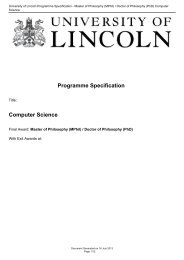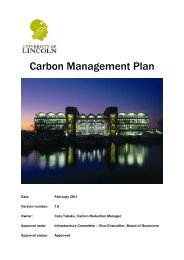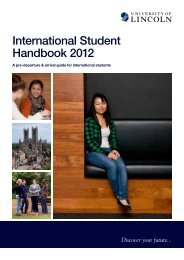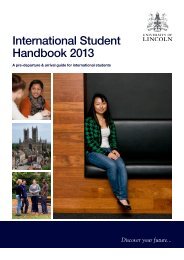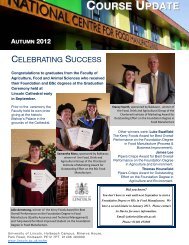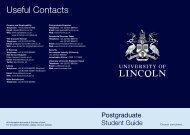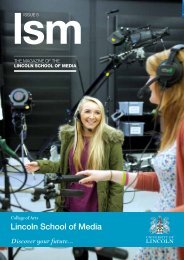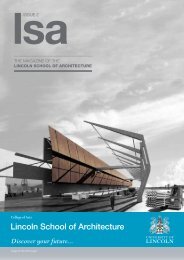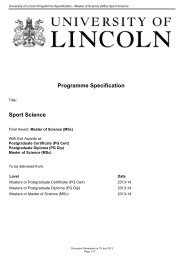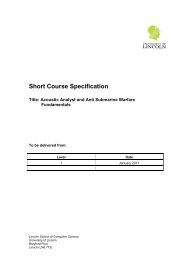LSH Magazine Issue 4 (PDF) - University of Lincoln
LSH Magazine Issue 4 (PDF) - University of Lincoln
LSH Magazine Issue 4 (PDF) - University of Lincoln
- No tags were found...
You also want an ePaper? Increase the reach of your titles
YUMPU automatically turns print PDFs into web optimized ePapers that Google loves.
Staff PublicationPerforming Masculinityin English <strong>University</strong>Drama, 1598-1636Christopher Marlow’s first book, published on5th April 2013, looks at a forgotten area <strong>of</strong> earlymodern literature: drama written and performedby sixteenth- and seventeenth-century studentsat the Universities <strong>of</strong> Oxford and Cambridge.GRADUATION CEREMONIESReferencing early modern English playtexts alongside contemporary records,accounts, and statutes, the book<strong>of</strong>fers an overdue assessment <strong>of</strong> therelationship between the dramatic efforts<strong>of</strong> the universities and early modern maleidentity. Taking into account the nearsingle-sex constitution <strong>of</strong> early modernuniversities, the book argues thatperformances <strong>of</strong> university plays,and student responses to them,were key ways <strong>of</strong> exploring andshaping early modern masculinity.Staff pr<strong>of</strong>ile:Dr Amy CulleySenior Lecturer in EnglishChristopher shows how the plays dealtwith their academic and social contexts,and analyses their responses tocompeting versions <strong>of</strong> masculinity.He also considers the implications<strong>of</strong> university authority and royalpatronage for scholarly performances<strong>of</strong> masculinity; the effect <strong>of</strong> theliterary traditions <strong>of</strong> classical friendshipand platonic love on academicrepresentations <strong>of</strong> male behaviour;and the relationship between universityDr Amy Culley began lecturing at<strong>Lincoln</strong> in 2007, after completing herundergraduate degree at the <strong>University</strong><strong>of</strong> Oxford and her postgraduatestudies at the <strong>University</strong> <strong>of</strong> London.Her research interests are in theliterature <strong>of</strong> the eighteenth century andRomantic period, primarily women’swriting and life writing. She is coeditor<strong>of</strong> an essay collection Women’sLife Writing, 1700-1850: Gender,Genre and Authorship and is currentlyfinishing her book British Women’s LifeWriting 1760-1840 that considers howwomen use autobiography to exploretheir relationships to religious, familial,social, and political communities. Herrecent work has also focussed onthe relationship between history andliterature in the eighteenth centurydrama and masculine initiation rituals.Including discussion <strong>of</strong> the Parnassustrilogy, Club Law and works by ThomasRandolph, William Cartwright, JohnMilton and others, this study shines newlight on long neglected aspects <strong>of</strong> thegolden age <strong>of</strong> English drama.Dr Christopher Marlow is the ProgrammeLeader for BA (Hons) English at the<strong>University</strong> <strong>of</strong> <strong>Lincoln</strong>.and particularly how life writingchallenges conventional historicalnarratives and practices. Theseinterests inform Amy’s teaching ona range <strong>of</strong> undergraduate modules,including Georgian Literature, VictorianLiterature, Women’s Writing and FeministTheory, and Life Writing. She also enjoysteaching across disciplinary boundarieson both the MA in English Studies andMA in Historical Studies in moduleson Nineteenth-Century Life Writingand Poetry. She is looking forwardto contributing to a new undergraduatemodule next year on the Literature<strong>of</strong> Childhood.Although a relatively new <strong>University</strong> established in 2001, you wouldbe forgiven for thinking that we are as old as Oxford, Cambridge orDurham when you attend our Graduation ceremonies.Each <strong>of</strong> the nine ceremonies takes placeover four days at <strong>Lincoln</strong> Cathedral,one <strong>of</strong> the most spectacular graduationvenues in the country. Steeped inhistory, the Cathedral provides the mostincredible backdrop for the culmination<strong>of</strong> our students’ hard work. Full <strong>of</strong>tradition, ceremony and reverence, thiswonderful occasion is the pinnacle <strong>of</strong>three years study for each and everygraduate who attends, watched onproudly by family and friends alike.Prior to graduation, our <strong>LSH</strong> Graduandsbegin the day in the grounds <strong>of</strong> <strong>Lincoln</strong>Castle where gowns are collectedand mortar boards donned, and theyreturn to the castle grounds afterthe graduation ceremony where thecelebrations can start in earnest inthe hospitality marquees.It is also an occasion to mark theachievements <strong>of</strong> notable persons whohave made a major contribution to theirchosen field at national or internationallevel by the awarding <strong>of</strong> an honorarydoctorate. Recent honorands from theHumanities include Inspector Morseauthor Colin Dexter OBE, BritishHistorian Pr<strong>of</strong>essor Paul Langford andArcheologist and writer Michael J. Jones.After graduation, the <strong>LSH</strong> alsomakes some awards <strong>of</strong> its own tograduands who have excelled duringtheir time at <strong>Lincoln</strong> at a specialceremony in the Bishops’ Palacesituated opposite the Cathedral.The awards are presented by theHead <strong>of</strong> School and family and friends<strong>of</strong> the award winners are also invited.1819



